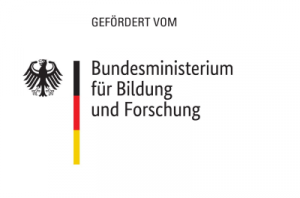1&∞🪑
The following images of chairs were generated with an Ai model titled Stable Diffusion, based on a prompt: a single chair on a white background.
This dataset derived as a result was used to train the Stable Diffusion model again, extending its knowledge capacity of what an image of a chair on a white background is.
This process was repeated again and again until after the 6th iteration, an initially figurative image of a chair was interpreted as a colourful digital noise as a result of a so-called data-cannibalism of a model. Thus revealing how easily is the new computational ontology corrupted through a process of feedback loop in an echo chamber.
“Scientific Collaboration Across Borders: The International Challenges of Analysing and Responding to Algorithmic Bias, Manipulation, and Misinformation”
Algorithmic bias, manipulation, and misinformation have become a global and existential threat that exacerbates existing social problems, degrades public life, cripples humanitarian initiatives, and prevents progress on other serious threats. The most advanced, most nuanced research on such threats comes from the focussed study of trends in English, with respect to US-based platform users, and through twitter. Technology firms admit that the vast majority of the problematic content they act on is in other languages, involves countries around the world, and platforms that share no data. Building up international scientific collaboration to do this work is a critical goal, and an International Panel on the Information Environment (IPIE) can be one response to the challenge.
The IPIE will establish a global scientific effort to independently analyse systems of information manipulation and bias, provide neutral assessments on the condition of the global information environment, and evaluate the best policy solutions for addressing threats to that environment. This initiative to empirically inspect, monitor, and verify the actions of technology firms and government regulators will have positive consequences for public life around the world. The mission of the IPIE is to provide policymakers, industry, and civil society with independent scientific assessments on the global information environment by organizing, evaluating, elevating, and coordinating research, with the aim of providing recommendations for improving the global information environment. In this presentation I review the current state of affairs in scholarly collaboration with technology firms and government policy makers and outline the opportunities for acting together as a research community. I offer an update on the organizational progress, and seek advice on what the governance structure should be, what domains of applied research should be a priority, and what review models might produce the most confident expressions of scientific consensus.
“The long arm of data: Anti-semitism and movements of people, objects, and terms”
Algorithmic bias and discrimination have been recognised as key threats in algorithmic decision making, text processing, and other data-rich information systems. Early computational mitigation approaches often focussed on equalising outcomes for groups described by a simple binary attribute, and they were largely history-free. Modern accounts recognise the challenges posed by the wider systemic nature of the problems and the need to integrate specific knowledge about already existing biases and discriminations. Focusing on anti-semitism, this panel will provide such specifics: from the effects of historical and current data labelling on what we (think we) know about migrations of people and art objects during and after the Third Reich, via the AI-supported detection of antisemitic speech online, to the question of how search engines open, block or modify our views on the holocaust.
Session Chair: Bettina Berendt (Weizenbaum Institute and TU Berlin)
- Meike Hopp (TU Berlin)
- Matthias J. Becker (TU Berlin)
- Helena Mihaljevic (HTW Berlin)
- Mykola Makhortykh (Bern University)
“AI, migration and labor markets”
Migrant workers represent a large portion of workers who process AI data sets. They also work extensively on online labor platforms, and are thus among those workers who are particularly affected by approaches to algorithmic management on platforms. In this session, we will focus in particular on working conditions in this field and on the role of migrant workers.
Session Chair: Martin Krzywdzinski (Weizenbaum Institute)
- Manuela Bojadzijev (Humboldt University) “Between presence and absence: labor and migration in AI”
- Callum Cant, Mark Graham (Oxford Internet Institute) “Fair AI platform work”
- Sarrah Kassem (University of Tübingen): “Global labor behind the digital interface: Alienation and agency of MTurk workers”
“Public employment services and recruiting”
Algorithmic decision making and other data processing is increasingly being used across a wide range of labour-related activities, from recruiting by private actors to assisting jobseekers by public authorities. What does this imply for the rights and opportunities of workers, job-seekers, counsellors, and other stakeholders? How can legal, computational, and other experts work together towards creating AI that benefits the relevant stakeholders, and how can they do it in the new legal setting that will be defined by the EU AI Act?
Session Chair: Sonja Mei Wang (TU Berlin)
- Adio-Adet Dinika (Bremen International Graduate School of Social Sciences) and Mona Sloane (New York University) “AI and inequality in hiring and recruiting – A field scan”
- Hannah Ruschemeier (Fernuniversität Hagen) “The problems of the automation bias in the public sector – a legal perspective”
- Alexander Bermann (University of Gothenburg) “Why does the AI say that I am too far away from the job market?”

